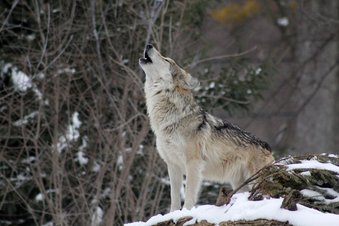
Whether you think it’s adorable or incredibly annoying, you’ve probably heard your dog howl before and wondered why on earth he does that. The reasons are numerous, as it turns out. In the simplest of terms, howling is just another way for dogs to communicate, just like barking, growling or whining. But let’s get into the science of it.
In the wild, wolves may howl in order to communicate to other packs that they’re approaching forbidden territory, or to guide a pack member back home who may have lost his way. Howling is incredibly difficult to study organically, however; it’s almost impossible to research in the wild because the behavior and movement patterns of wolves is so vast. Dr. Arik Kershenbaum, a zoology research fellow at the University of Cambridge, says that trying to study wolf howls “is like trying to follow a whale underneath the ocean. We simply cannot keep up with them.”
Additionally, studying howling in captive wolves and dogs is nearly pointless because they simply don’t howl for the same reasons that their wild counterparts do.
Instead of howling to ward off an opposing pack, your dog likely howls when he hears a loud noise that’s hurting his ears (like an ambulance siren or you breaking out your old trumpet from high school), or to try to get your attention when you (the pack leader) leave - in other words, he misses you when you’re gone!
Another theory is that your dog might be howling along with your loud music because he wants to fit in with the pack and imitate the group’s behavior.
Past that, we don’t really know much else about why domesticated dogs howl, as most behavioral research on dogs has focused on barking and human-dog interactions - dogs do much more barking than their wolf cousins.
Lastly, if you’re thinking about getting a dog and you want to avoid the doggy singing, it’d probably be wise to stay away from the following breeds: Alaskan Malamute, Beagle, Husky, Hound breeds, and the Tamaskan Dog to name a few.
We may not know that much about howling in the grand scheme of things, but one thing researchers do know is that wolves and dogs don’t actually howl at the moon!
In the wild, wolves may howl in order to communicate to other packs that they’re approaching forbidden territory, or to guide a pack member back home who may have lost his way. Howling is incredibly difficult to study organically, however; it’s almost impossible to research in the wild because the behavior and movement patterns of wolves is so vast. Dr. Arik Kershenbaum, a zoology research fellow at the University of Cambridge, says that trying to study wolf howls “is like trying to follow a whale underneath the ocean. We simply cannot keep up with them.”
Additionally, studying howling in captive wolves and dogs is nearly pointless because they simply don’t howl for the same reasons that their wild counterparts do.
Instead of howling to ward off an opposing pack, your dog likely howls when he hears a loud noise that’s hurting his ears (like an ambulance siren or you breaking out your old trumpet from high school), or to try to get your attention when you (the pack leader) leave - in other words, he misses you when you’re gone!
Another theory is that your dog might be howling along with your loud music because he wants to fit in with the pack and imitate the group’s behavior.
Past that, we don’t really know much else about why domesticated dogs howl, as most behavioral research on dogs has focused on barking and human-dog interactions - dogs do much more barking than their wolf cousins.
Lastly, if you’re thinking about getting a dog and you want to avoid the doggy singing, it’d probably be wise to stay away from the following breeds: Alaskan Malamute, Beagle, Husky, Hound breeds, and the Tamaskan Dog to name a few.
We may not know that much about howling in the grand scheme of things, but one thing researchers do know is that wolves and dogs don’t actually howl at the moon!





 RSS Feed
RSS Feed

